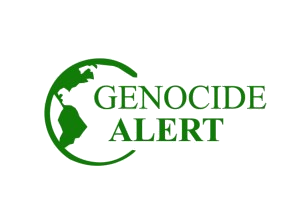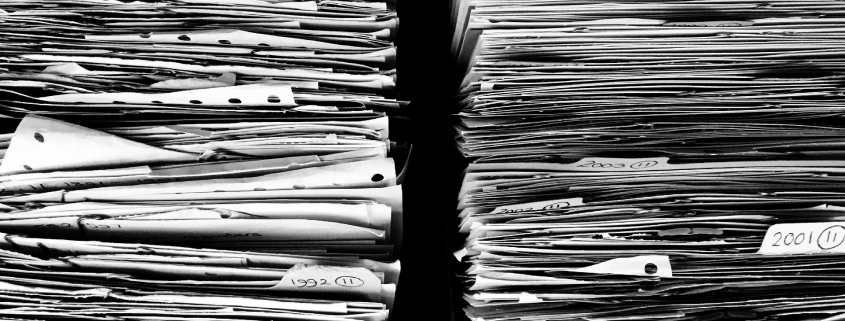Without the documentation of mass atrocities, there is no accounting for the past, no prevention for the future, and no prosecution in the present. Recording what happened, where, when, how, by whom and to whom is the cornerstone of an international system that is committed to putting an end to mass atrocity crimes.
That is why Genocide Alert is dedicating this online event series to pulling back the curtain on how and why we document mass atrocities. Within the series, we want to take a closer look not only at the actual documentation process/methods but also reflect on the underlying motives and principles. Bringing together practitioners, scholars, and advocates, each event explores different dimensions and nuances of the documentation process and aims to open discussions on where atrocity documentation stands right now and where it should be moving in the future.
You can find descriptions of the individual events and the links to sign up for them below. Please note that registration is mandatory.
1) Survivors, Bereaved, and the Right to Truth: Documentation and Healing (27 October 2025, 4:30-5:30 PM CEST)
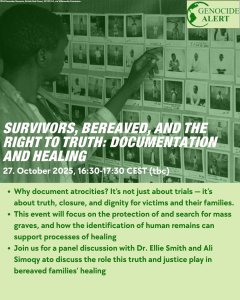 Why do we document atrocities? To enable criminal proceedings, would be the obvious answer. But why is that process so important for victims and their loved ones? What significance do the truth and the investigation of facts have for them? And how do they contribute to individual and communal healing?
Why do we document atrocities? To enable criminal proceedings, would be the obvious answer. But why is that process so important for victims and their loved ones? What significance do the truth and the investigation of facts have for them? And how do they contribute to individual and communal healing?
This event will focus on the search for and protection of mass graves. Beyond the actual human remains and evidence for unimaginable atrocities they contain, mass graves also hold the long-searched truth and closure for the victims’ loved ones. They are as much sites of loss and suffering as they are sites of potential truth and justice. Joining our panel discussion will be Dr. Ellie Smith from Bournemouth University and TortureID as well as Ali Simoqy who has worked on site for the International Commission on Missing Persons with Iraqi and Yezidi communities to discuss the role this truth and justice play in the bereaved families’ healing. Our speakers bring extensive experience in field work as well as academic reflection on this field work to the table to reflect the relationship between (transitional) justice, trauma, and healing.
Sign up here: https://zoom.us/meeting/register/5bkLNNHgTheu_Q4CpUygGw
2) The Ethics of Documenting Atrocities (10 November 2025, 4:30 PM CET)
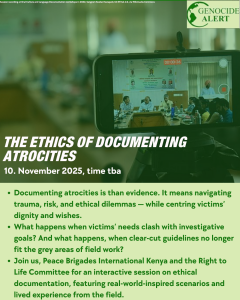 The documentation of atrocities is far more than a mere collection of evidence. It is also the documentation of individual trauma, of vulnerability and of cruelty, and it takes place in high-stress, high-risk situations. Those who participate in the documentation process are not only in charge of securing a path to justice but also respecting the victims’ dignity and wishes. To ensure both, documenting organisations are usually guided by rules and principles for their work. But what does an ethical documentation of mass atrocities look like? How can the process put the victims at its centre? When effective documentation and the victims’ wishes find themselves at tension, how can they be weighed against each other? And what happens when clear-cut guidelines no longer fit the grey areas of field work?
The documentation of atrocities is far more than a mere collection of evidence. It is also the documentation of individual trauma, of vulnerability and of cruelty, and it takes place in high-stress, high-risk situations. Those who participate in the documentation process are not only in charge of securing a path to justice but also respecting the victims’ dignity and wishes. To ensure both, documenting organisations are usually guided by rules and principles for their work. But what does an ethical documentation of mass atrocities look like? How can the process put the victims at its centre? When effective documentation and the victims’ wishes find themselves at tension, how can they be weighed against each other? And what happens when clear-cut guidelines no longer fit the grey areas of field work?
For this event, we are happy to work with Peace Brigades International’s (PBI) Kenya team and the Right to Life Committee of the Social Justice Centre Movement. The Right to Life Committee documents cases of excessive use of force by the police and are accompanied by the local PBI team. This is an interactive event that invites the audience to reflect on fictitious scenarios, inspired by true cases, in the documentation process and the challenges and dilemmas they entail.
Sign up here: https://zoom.us/meeting/register/Y95fwTRfQ0WdOzRhfdGfxA
3) OSINT and Digital Evidence (19 November 2025, 4:00 PM CET)
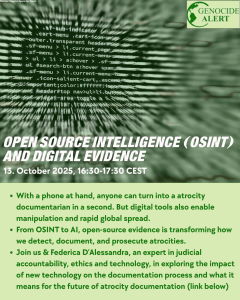 With a phone at hand, anyone can turn into a mass atrocity documentarian in a second. With AI and other digital tools, said footage can be altered in a matter of minutes. With a connection to the internet, it can spread around the globe within hours. And with more information available online than ever before, the investigation of mass atrocities has long turned to all these openly available materials as sources for evidence.
With a phone at hand, anyone can turn into a mass atrocity documentarian in a second. With AI and other digital tools, said footage can be altered in a matter of minutes. With a connection to the internet, it can spread around the globe within hours. And with more information available online than ever before, the investigation of mass atrocities has long turned to all these openly available materials as sources for evidence.
That is why, for the first event in our series, we take a closer look at how information technology has revolutionised mass atrocity documentation. Together with our guest speaker Federica D’Alessandra, we want to explore the potential OSINT and other digital evidence hold for early atrocity warning and prevention, how both can be used for advocacy and in judicial proceedings, and the role new actors are starting to play in atrocity documentation.
We are happy to be joined by Federica D’Alessandra, Deputy Director of the Oxford Institute for Ethics, Law, and Armed Conflict and founding Executive Director of the Oxford Programme on International Peace and Security. She has contributed to numerous publications, among them the ICC Guidelines for Civil Society Contribution and the Berkley Protocol on Open-Source Investigations. As an expert in judicial accountability, ethics and technology, we are looking to reflect on the impact of new technology on the documentation process and what it means for the future of atrocity documentation with her.
The event will consist of an interview and public Q&A.
Sign up here: https://zoom.us/meeting/register/nmRf1EXbTv6iSFT9q1CaIA
